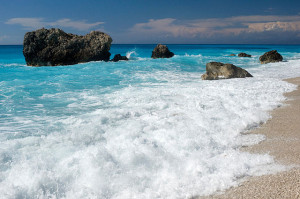Treceți offline cu aplicația Player FM !
Episode 16 – Sun & Surf
Manage episode 56677723 series 30865

Source: The Wikipedia
For our first episode of the summer on LASER: Let’s Agree Science & Engineering are Rad, we discuss our own Chris’ recently-accepted paper about inorganic ZnS window layers on organic solar cells. These increase the efficiency, and help protect the cell from environmental damage. We then talk about the NRL Press release describing long-chain hydrocarbon fuel (jet fuel) they have made by extracting CO2 and Hydrogen from seawater!
4:00 We’re all back from traveling for work and conferences, finals are done, and Chris just finished his qualifying exams, so we’re back to podcasting, even if we are a little rusty.
6:00 Our first paper is somewhing Chris just got accepted into Journal of Applied Physics, and it is titled “Efficient ZnS cathode layers for orgnaic photovoltaic applications via n-type doping.”
They are using an inorganic material, ZnS to replace the very sensitive organic cathode (top) layer in organic photovoltaics. Since the organic components are very sensitive to temperature and air, an inorganic cathode can protect the bottom layers.
At the time we’re putting this episode out, the paper isn’t available online yet, but it will eventually be available at http://dx.doi.org/10.1063/1.4878155
32:30 We discuss the recent press release from NRL (http://www.nrl.navy.mil/media/news-releases/2014/scale-model-wwii-craft-takes-flight-with-fuel-from-the-sea-concept) describing fuel made from CO2 and Hydrogen that was extracted from seawater. There are a number of press articles about this: Discovery (http://news.discovery.com/tech/alternative-power-sources/us-navy-game-changer-seawater-turned-into-fuel-140408.htm) Business Insider (http://www.businessinsider.com/christopher-harress-us-navy-technology-to-turn-seawater-into-fuel-2014-4) and Inhabitat (http://inhabitat.com/u-s-navy-converts-seawater-into-jet-fuel-using-game-changing-technology/) are a few.
38:00 Removing Co2 from ocean water *might* have a small local effect reducing ocean acidification, but because the end result is burning a hydrocarbon fuel, it will end up just going back into the atmosphere and back into the oceans.
Links to the music used in this week’s episode:
Intro: Luv Rulez (Original version of ES) – Crying (Return to Olde World)
bumper music: Vacation – Crying
Outro: Dreams are Maps – The Wild (Dreams are Maps)
26 episoade
Manage episode 56677723 series 30865

Source: The Wikipedia
For our first episode of the summer on LASER: Let’s Agree Science & Engineering are Rad, we discuss our own Chris’ recently-accepted paper about inorganic ZnS window layers on organic solar cells. These increase the efficiency, and help protect the cell from environmental damage. We then talk about the NRL Press release describing long-chain hydrocarbon fuel (jet fuel) they have made by extracting CO2 and Hydrogen from seawater!
4:00 We’re all back from traveling for work and conferences, finals are done, and Chris just finished his qualifying exams, so we’re back to podcasting, even if we are a little rusty.
6:00 Our first paper is somewhing Chris just got accepted into Journal of Applied Physics, and it is titled “Efficient ZnS cathode layers for orgnaic photovoltaic applications via n-type doping.”
They are using an inorganic material, ZnS to replace the very sensitive organic cathode (top) layer in organic photovoltaics. Since the organic components are very sensitive to temperature and air, an inorganic cathode can protect the bottom layers.
At the time we’re putting this episode out, the paper isn’t available online yet, but it will eventually be available at http://dx.doi.org/10.1063/1.4878155
32:30 We discuss the recent press release from NRL (http://www.nrl.navy.mil/media/news-releases/2014/scale-model-wwii-craft-takes-flight-with-fuel-from-the-sea-concept) describing fuel made from CO2 and Hydrogen that was extracted from seawater. There are a number of press articles about this: Discovery (http://news.discovery.com/tech/alternative-power-sources/us-navy-game-changer-seawater-turned-into-fuel-140408.htm) Business Insider (http://www.businessinsider.com/christopher-harress-us-navy-technology-to-turn-seawater-into-fuel-2014-4) and Inhabitat (http://inhabitat.com/u-s-navy-converts-seawater-into-jet-fuel-using-game-changing-technology/) are a few.
38:00 Removing Co2 from ocean water *might* have a small local effect reducing ocean acidification, but because the end result is burning a hydrocarbon fuel, it will end up just going back into the atmosphere and back into the oceans.
Links to the music used in this week’s episode:
Intro: Luv Rulez (Original version of ES) – Crying (Return to Olde World)
bumper music: Vacation – Crying
Outro: Dreams are Maps – The Wild (Dreams are Maps)
26 episoade
All episodes
×Bun venit la Player FM!
Player FM scanează web-ul pentru podcast-uri de înaltă calitate pentru a vă putea bucura acum. Este cea mai bună aplicație pentru podcast și funcționează pe Android, iPhone și pe web. Înscrieți-vă pentru a sincroniza abonamentele pe toate dispozitivele.




